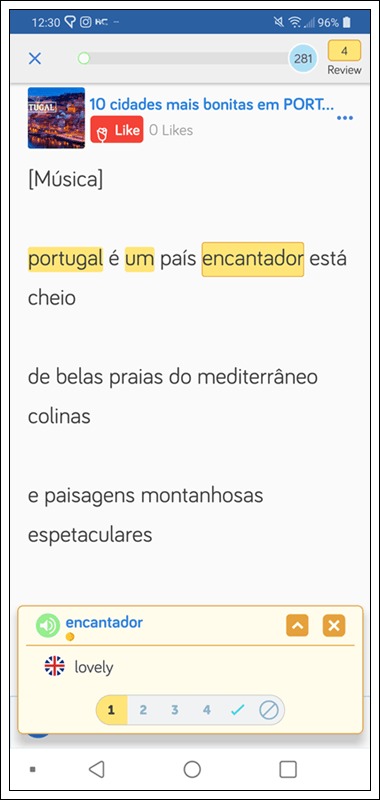Portuguese Speaking Countries
When you read the title of this post, you probably thought of Portugal and Brazil. Indeed, they are the most well-known Portuguese-speaking countries of the world. However, did you know that there are seven other countries that speak Portuguese? In this post, you’ll discover what they are and some particular Portuguese words and expressions spoken by their people.
Before we get started, here’s some historical information about the Portuguese language: it comes from vulgar Latin, the language spoken by the people dominated by the Roman Empire. When Rome conquered the Iberian Peninsula, they introduced vulgar latin in the region, which merged with the local preexisting languages to create some languages, including modern Portuguese.
Countries that speak Portuguese
Portugal
It is only fair to start with Portugal, because that’s where the language originated! Portugal is situated at the south-west point of Europe, is made up of beautiful cities, and has a population of about 10 million. Although Portuguese is the official language, many people are able to speak English, French and Spanish. Here are some common phrases you may find if you travel to Portugal:
Bica – Espresso
Casa de banho – (literally “bath house”) Bathroom
Está tudo fixe – Everything is fine
Viva! – Congratulations!
Brazil
Discovered by the Portuguese navigator Pedro Álvares Cabral Brazil has a population of over 200 million people and is the largest Portuguese-speaking country of the world. Situated in South America, Brazil is famous for its soccer teams and wonderful beaches.
Bater papo – Chat
Acabar em pizza – (literally “end up in pizza”) Come on nothing
Eita! Uai! Bah! Vixe! Tchê! – Commonly used interjections
Dor de cotovelo – (literally “pain on the elbow”) Envy
Angola
Among the few African countries that speak Portuguese, there’s Angola. It was discovered by the Portuguese navigator Diogo Cão and colonized by Paulo Dias de Novais. Although its official language is Portuguese, African languages, such as Umbundo, Kimbundo and Kikongo, are usually spoken. In addition, the Angola counts with other 20 local languages and 50 dialects.
Bazar – Go away
Chuinga – Chewing gum
Machimbombo – Bus
Garina – Girl
Guinea-Bissau
Guinea-Bissau is a country in West Africa and has a population of 1.8 million. Less than 15% the population speak Portuguese, even though it is the official language of the country. Most locals prefer using the Portuguese creole and other African languages. Here are some basic words of Portuguese creole:
Bom dia / Bo tardi / Bo noti – Good morning / Good afternoon / Good night
Kuma k’ bu sta / kuma di kurpu? – How are you?
Te logu – See you later
Mozambique
Officially called the Republic of Mozambique, this country is located in Southeast Africa and has a population of around 30 million. Many people here speak Portuguese as a second language. More common languages are Makhuwa, Sena, and Swahili.
Jobar – (merge of job + trabalhar) go to work
Biznar – Do business
Brada – Brother
Brai – Barbecue
Cape Verde
Cape Verde is an island discovered and colonized by Portuguese navigators in the 15th century. Cape Verde’s official language is Portuguese and used by the government, in newspapers, television, and radio. However, Cape Verdean Creole is used colloquially and is the mother tongue of virtually all the population of Cape Verde.
Sodade – (variation of saudade) feeling of missing someone or something
Morabeza – Kindness
East Timor
East Timor is a country in Southeast Asia that was colonised by Portugal in the 16th century, and was known as Portuguese Timor until 1975. The population is around 1.3 million and the country has two official languages: Portuguese and Tetum, but English and Indonesian are often spoken too. Check out the comparisons of some words in Portuguese and in Tetum:
Obrigado / Obrigadu – Thank you
Sim / Loos – Yes
Não / Lae – No
Adeus / Hau ba lai – Goodbye
Sao Tome and Principe
Sao Tome and Principe is an island country in the Gulf of Guinea, off the western equatorial coast of Central Africa. The islands were uninhabited until their discovery by Portuguese explorers in the 15th century. With a population of around 200,000 people, Sao Tome and Principe is the second-smallest African sovereign state, after Seychelles. Here are some typical Portuguese expressions of Sao Tome and Principe:
Gandu – Shark
Leve-leve – Slow
Sanguê – Lady
Margoso – Angry
Equatorial Guinea
Equatorial Guinea is a country located on the west coast of Central Africa, consisting of two parts, an insular and a mainland region. For years, the official languages of Equatorial Guinea were Spanish and French. It was only in 2010 that Portuguese was also adopted as an official language. Fa d’Ambô, a Portuguese creole, is also widely used in some areas of the country.
Improve your Portuguese by using content you love
Wouldn’t you rather learn Portuguese using content that you love?
The best way to keep your favorite content organized and create interactive lessons is to use LingQ, a language app that lets you learn from content you love.
Whether it’s a video from YouTube, a podcast, a blog, or TV series, LingQ has the ability to these into interactive lessons.
For example, you can import one of the YouTube videos I shared in this article into LingQ and create a personalized lesson where you can read, save new words, listen, and much more. Here’s how:
Get the LingQ extension and head to YouTube then click import. Please note, videos must have closed captions enabled.

That’s it! Here’s a quick snapshot of what imported content looks like on LingQ’s mobile app (available for Android and iOS).

LingQ lets you listen to the audio so you can hear how the Portuguese words are pronounced, look up words with a single tap , save them, and has a built in SRS for review. Not only that, but LingQ also comes with 100s of professionally recorded Portuguese lessons for you to read and listen to.
Give it a try today and begin your journey to fluency. You’re guaranteed to make a breakthrough.
***
Ivy do Carmo is a Brazilian content writer and translator whose passion has always been learning and teaching the English language.

